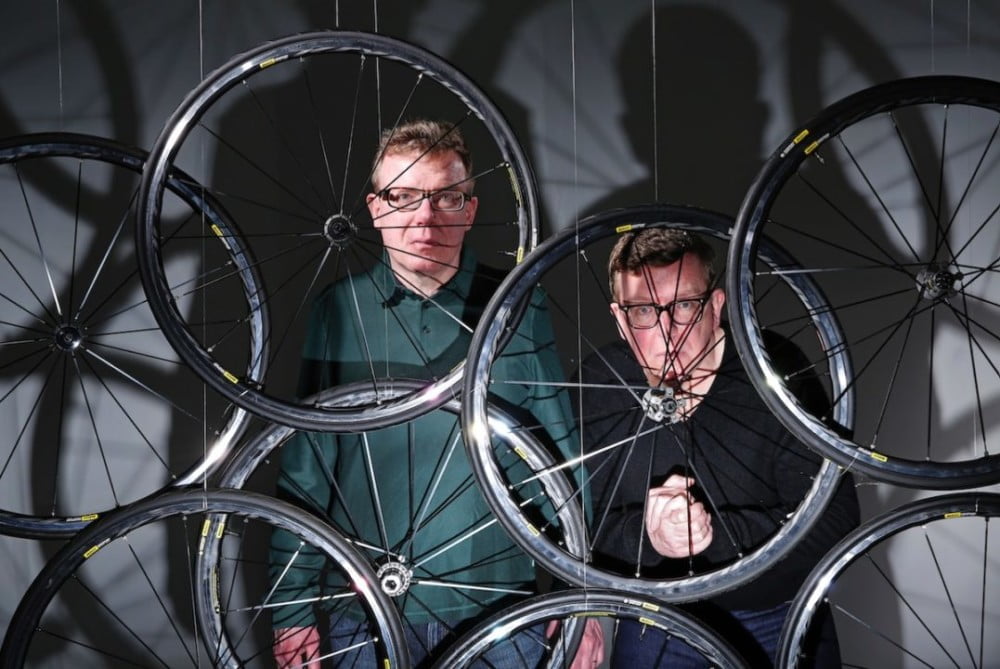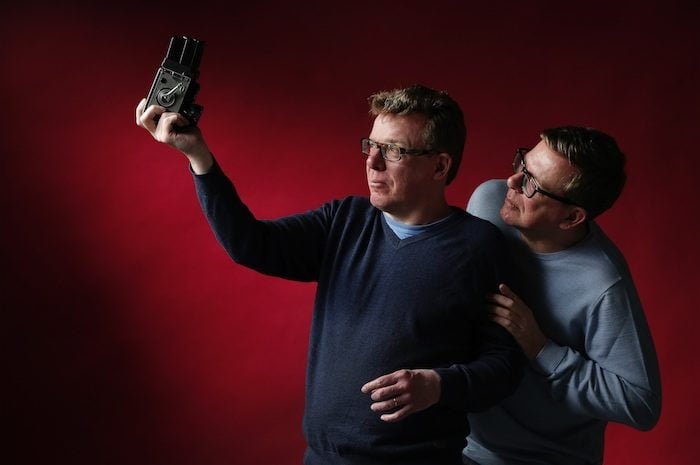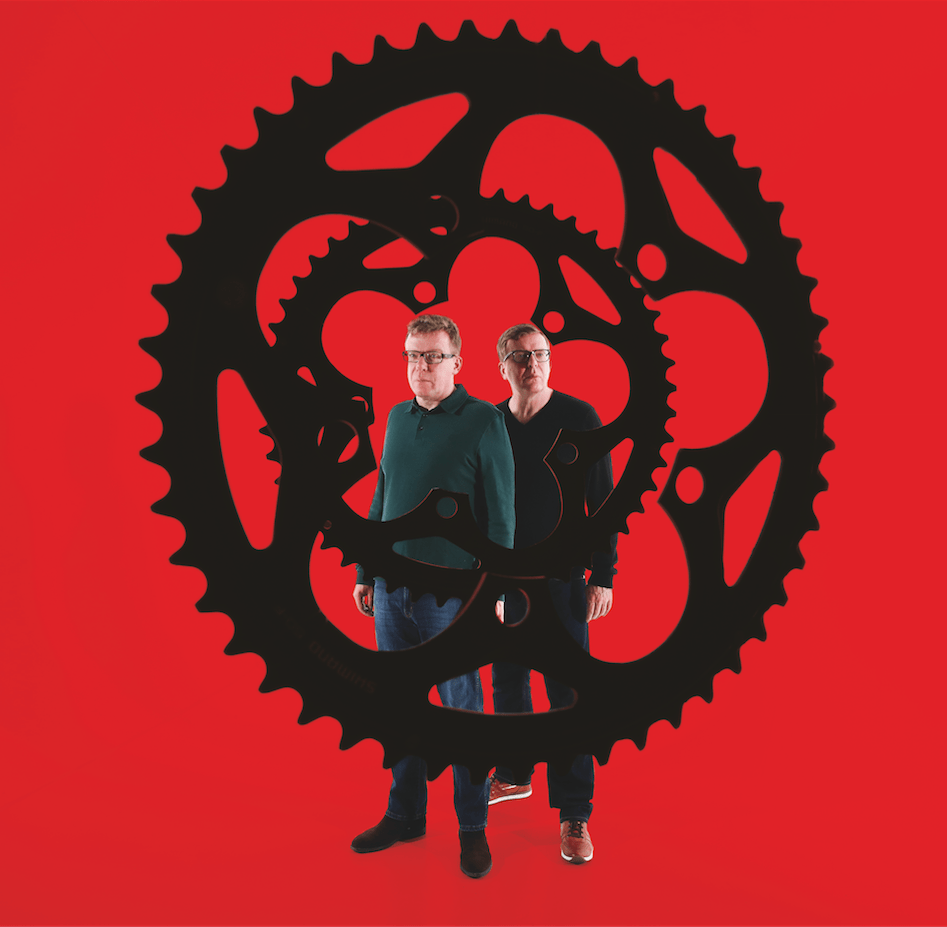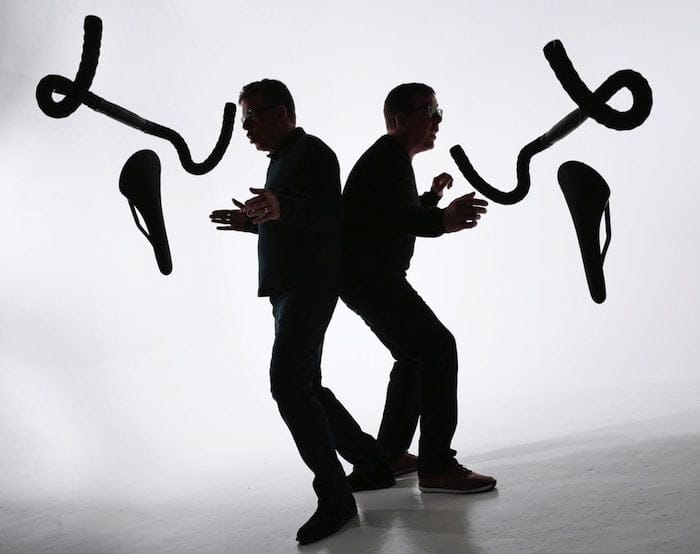Fresh from celebrating their 30th anniversary, The Proclaimers are back with energetic, politicised new album Angry Cyclist. Classic Pop meets the Reid twins in Edinburgh to hear why it’s important to stay fresh – and how the spectre of unemployment still haunts them, decades on…
Written by John Earles

Face to face, it’s actually very easy to tell The Proclaimers twins Craig and Charlie Reid apart. For over a decade, guitarist Charlie has only worn glasses on stage, preferring contact lenses when he’s not on full Proclaimers duty. Chief songwriter Craig is also wirier and more intense than his laid-back brother.
Both are good hosts. Aware that Classic Pop is only in Edinburgh for the afternoon before going back to London, they meet us at The Balmoral Hotel, right next to Edinburgh Waverley station, in order to maximise interview time. Also with us is their 6′ 6″ manager Kenny MacDonald, an amiable presence who has represented the Reids since before they were signed. “We’ve had the same tour manager, Tom Oliver, since the start too,” notes Craig. “If you’ve got folk you can rely on who do their job properly, keep with them.”
In the next 90 minutes over tea (Craig) and Diet Coke (Charlie), it’s clear The Proclaimers are closer to their blue-collar roots than pretty much any successful musicians this side of Bruce Springsteen. It’s not an affectation; more that the Reid brothers know how very different their lives could have been.
Although it’s been 31 years since Letter From America and debut album This Is The Story made the twins stars, Craig and Charlie had each endured six years of unemployment before finding success in their mid-20s. They’d begun The Proclaimers after a succession of teenage punk bands eventually slimmed down to what now seems the most obvious idea: just the twins and Charlie’s guitar, going full-tilt at the world. “You always feel slightly insecure if you’ve been unemployed as long as we were,” explains Charlie. Craig nods his agreement. “It marks you. It’s not just having no money, it’s having no control of your destiny. That’s frightening. And it doesn’t leave you, ever.”
It’s also worth remembering just how unlikely The Proclaimers’ break was. They’d first had the idea of forming a band after seeing Dexys Midnight Runners in Fife, blagging it backstage and persuading Kevin Rowland to fund their first demo. This was sent by a friend to The Housemartins, who were so impressed, they offered the unsigned duo the support slot on the tour for their second album, The People Who Grinned Themselves To Death.
“We’d never played to more than 50 people and more usually 10 people,” recalls Craig. “We got the overnight bus from Edinburgh before that first Housemartins gig in Birmingham. That was to 2,000 people – we were terrified!” Charlie recognises the debt they owe Dexys and The Housemartins, fellow politicised working-class bands. “We’d have kept trying if those demos hadn’t had that impact,” he ponders. “But it’s important to acknowledge there’s a distinct possibility success wouldn’t have happened without them, and so to be grateful for what we have. Those two bands were highly instrumental for us.”
Old Anger, New Politics
The Proclaimers are skilled at writing quirkily romantic songs, typified by the sweetly funny I’d Ask The Questions on new album Angry Cyclist. But, right back to the list of recently closed steel mills recited in Letter From America, the Reid brothers have also taken left-wing politics to the masses. You hear it in the title track of Angry Cyclist, an image Craig feels summarises the incoherent anger surrounding Brexit and Donald Trump.
“I’ve always felt angry about politics,” smiles Craig, whose wife Petra is the daughter of late Scottish National Party deputy leader Margo MacDonald. “But it feels now like the gloves are off. There’s a disinclination to acknowledge that the other side might have a point. Trump becoming President proves lies can win: keep telling absolute lies and enough folk will believe it to get you over the line. That’s new.”
Charlie emphasises the importance of not living in an echo chamber of your own political views. “You have to question yourself,” he states. “You mustn’t tolerate racism or bigotry, but you have to listen to people who don’t share your view and not be so certain in your own opinions.”
Last year marked the 30th anniversary of Letter From America reaching No.3, marked by an accompanying BBC documentary. Are the pair gutted they didn’t get Angry Cyclist out in time for the celebrations? “Ah, we’ve long given up on the idea of more hit records,” says Craig, while Charlie chuckles beside him, then points out that, since Persevere in 2001, The Proclaimers’ career has been a model of efficiency: a new album every two or three years, with an accompanying lengthy tour. In the UK alone, there are 47 dates for Angry Cyclist.
“We couldn’t have finished this new record any quicker than we did,” Craig says. “I think the quickest we’ve ever written an album is five months, and Angry Cyclist took just over a year. It’s not any harder to write new songs, but it’s not any easier, either.”
Charlie adds: “If we stopped writing new songs, that’d be the end of the story for us. Nothing against guys who just rely on the old hits, but that’s not for us. And we can’t take too long a break, because then your voice is wrecked.”
Musicals and Movies
At least they’re still able to enjoy themselves on tour. New song The Battle Of The Booze sees various drinks compete against each other with – spoiler alert – vodka declared the champion. “There’s many nights when we’ll have a good drink after a show,” smiles Craig, who really does favour vodka. “But never, ever before a gig. That’s embarrassing.” That philosophy dates back to pre- Proclaimers days, when the Reids witnessed musicians going on stage half-cut. Whisky connoisseur Charlie remembers: “You’d see shaky singers going: ‘I play better when I have a drink’ and they’d be wrecks. We understood we’d never be as good, even if it was just one or two drinks inside us.”
Although The Proclaimers are well structured now, at their height they effectively disappeared for 13 years. Following second album Sunshine On Leith in 1988, there was just 1994’s Hit The Highway before they returned with Persevere. They helped raise their respective children and were devastated by the death of their father in the interim, but Charlie confesses: “It wasn’t like we didn’t want to be in the band any more. Life was carrying on in other directions but even then, no, we shouldn’t have been away that long. When we came back with Persevere, we played really small venues and didn’t know if people would still be interested.”
People certainly were, partly thanks to the musical Sunshine On Leith, which eventually became a well-received film starring Peter Mullan and Jane Horrocks. The musical began as a low-key project in Dundee, with the twins initially sceptical of its writer Stephen Greenhorn’s approaches.
“I didn’t think it was a wind-up,” recalls Charlie, “I just thought, ‘well, good luck with that…’. We’ve been very fortunate with the musical, because you reach more people than we ever would with an album. You forget how many people in Britain will never go to a concert, because they’re too old, too infirm, or they just don’t have the money. But once that film is on TV…”
Craig picks up the story. “I’ve seen four different productions and, hopefully, it’s going to the West End next year. It’s surreal, every time, especially seeing a woman sing my lyrics. You go back to where you were when you wrote those early songs, skint and unemployed, and you’re welling up!” He bursts into a wry laugh.
The title track of Sunshine On Leith has another life, as the terrace anthem for the twins’ beloved Hibernian. It’s been played to pump up the crowds after big wins ever since a UEFA Cup game in 2001 against Greek side AEK Athens. Angry Cyclist is The Proclaimers’ first album since Hibernian finally won the Scottish Cup trophy for the first time since 1902, when they beat Rangers 3-2 with a goal at the death in the 2016 final. They’d lost 10 major finals in the intervening 114 years, yet the Reid brothers weren’t there to see the emotional scenes of Sunshine On Leith being sung by Hibs’ fans in the aftermath. Instead, they were backstage in Salisbury. Craig says: “I never thought I’d see us win a final, anyway! I’m just glad the curse is lifted. It’s some skill, to lose every final since 1902, but we won it. We saw it on a laptop and, when the final whistle went, wow, it was a weight off our shoulders!”
No Compromise
Craig calls Sunshine On Leith “by far the best song I’ve written”. Yet, on its release as a single in 1988, he and Charlie refused to cut down the anthem into a radio edit. “You don’t cheapen a song like Sunshine On Leith,” he says. “That song is what it is. And it’s six minutes.”
It’s a stoic attitude that typifies The Proclaimers’ determination to honour their own music. Their only single before Letter From America was Throw The ‘R’ Away, which railed against record execs who refused to sign The Proclaimers because of their broad Scottish accents. “To an extent, those record companies were right,” says Charlie. “The way we sing, it does limit the number of people willing to listen. But it also makes you stick to your guns. It’s the same with how we look. We knew from the start that being twins with glasses, singing in our own voices… you stand out, but it’s not mass appeal.”
They’re also calm about the legacy of I’m Gonna Be (500 Miles) – one of the quickest songs Craig has ever written. “I’m just glad it happened!” he laughs. “Financially, it’s been fantastic, and that means artistically it’s allowed us to keep making the records we want.” Because it was written so quickly, Charlie points out they’ve learned not to question songs which arrive speedily.
“If a song seems to write itself, you record it quickly, like we did with …(500 Miles),” he explains, before songwriter Craig adds: “because you can guarantee the next song won’t be so quick”.
Unlike the stereotype of musical brothers, there seems to be little tension between the Reids. It’s a friendship as well as familial association which Charlie alludes to when he explains how Dave Eringa came to produce Angry Cyclist, having first worked with the pair on previous album Let’s Hear It For The Dogs. Eringa has also worked with Manic Street Preachers, Kylie and Roger Daltrey. “Dave nearly always works with artists more than once,” says Charlie. “He understands the politics of bands. Not that there are many politics with us… I hope!”
Which just leaves the big difference of their attitude to contact lenses. Craig has the worse eyesight of the twins, yet grimaces at the idea of “poking about in my eyes”, while Charlie despairs at how expensive glasses are now. “I’m recognised anyway,” he shrugs. “When we’re on tour, I can’t be bothered taking time to put my lenses in, so people spot me regardless, especially with Craig. I’m aware we’re hard to miss!”
Read more: The French New Wave: Carpenter Brut interview
Classic Pop may earn commission from the links on this page, but we only feature products we think you will enjoy.





